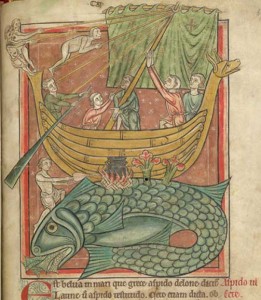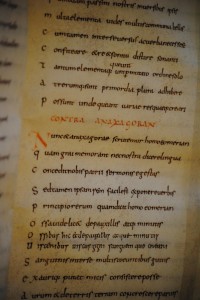
Whale, ink and pigment on vellum, anonymous illustrator from the Harley Bestiary, c 1235. Source: http://goo.gl/NtDvvA
In the summer of 2014 Professors William Turpin (Swarthmore College,
Classics) and Bruce Venarde (University of Pittsburgh, History) will
offer a second free online Latin translation course, meeting as a Google
Hangout. The class will meet once a week starting on Monday, June 2nd,
from 8:00PM to 9:15 or 9:30 PM EST, and will continue for perhaps ten
weeks. We will be translating and discussing Jerome’s “Life of Malchus”
and the anonymous “Voyage of St. Brendan.” Both texts are interesting in
themselves (at times they are downright exciting), and they are
important documents in the history of Medieval monasticism. The course
is intended for students who have completed a year or so of classical
Latin at the college level, or the equivalent in high school. It should
also be suitable for those whose Latin may be a little rusty, or for
more accomplished Latinists with an interest in medieval Latin.
To participate or to receive updates on the course it will necessary to
have a Google account, and to join the Google Plus “Community” called
“Medieval Latin (Summer 2014): Malchus and Brendan.”
Google Hangouts will allow eight active participants (i.e. people who
may wish to translate a particular section of text) and an unlimited
number of auditors, who will be able to follow on YouTube and submit
questions and comments using the messaging function. The sessions will
also be archived on YouTube (sessions from 2013 can be found if you
search “Gesta Francorum”); this will make it possible for people to
catch up for missed sessions if they wish to, and of course it will make
the sessions easier for people in different time zones.
Anyone wanting to be an active participant will need a computer with a
webcamera and microphone, and perhaps also a quiet room. We will provide
a webpage for interested participants to sign up for particular sections
of the text; such participants will then be invited to translate and to
raise questions or comment as seems appropriate. The “instructors,” and
other active participants will offer assistance and comments as
necessary, just as in an ordinary class with participants sitting around
a table.
The basic intention of this course is to replicate to the extent
possible the experience of a student in (say) a college Latin class at
the early intermediate level, minus the quizzes, tests, and continuing
assessment; at present we have no mechanism for awarding credit or
certificates of attendance. The most immediate model, in fact, may be an
informal reading group devoted to a particular ancient or medieval text.
The basic premise, as with those reading groups, is that a small
community of interested participants can both encourage and enhance what
is essentially a private encounter with a text.
For texts and signup sheet go to
https://sites.google.com/a/swarthmore.edu/medieval-latin-summer-2013-the-gesta-francorum/
Questions may be addressed to wturpin1@swarthmore.edu

